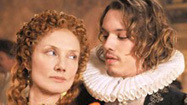|
Movie review: 'Anonymous'
Posted on: 11/02/11
The film, with Rhys Ifans as Edward de Vere, the film's purported bard behind Shakespeare, is no classic, but it's fun. "Anonymous" — starring a sizable swath of Britain's resident acting class — is an ambitiously biting (gnawing?) literary whodunit turning on the Shakespeare question. As in, who really wrote all those seminal plays and sonnets, a long-running scholarly debate that (unlike the actual author) apparently will never die. That might sound like costume drama taken to deadly boring academic extremes. But surprisingly, in director Roland Emmerich's usually effects-heavy hands ("Independence Day," "The Day After Tomorrow" and oh so many more), we have something closer to a fanciful commedia dell'arte. It's Shakespeare as B-movie, if you will, or to borrow from the bard, a boffo blast, which I'm pretty sure is from either "King Lear" or "Hamlet." There are palace intrigues, beddings and beheadings, and lots of well-staged theater. Rhys Ifans turns out to be the best surprise of all — excellent as the eminence of pathos, the 17th Earl of Oxford, who (in this telling) wielded "the" mighty pen and had the ink-stained hands to prove it. Screenwriter John Orloff ("A Mighty Heart") doesn't do half bad himself. "William Shakespeare" — whoever he was — I think would probably be at least a little amused by "Anonymous." For amusing it is — along with bawdy, brazen, politically outrageous, plausible enough and occasionally graced with something close to Shakespearean cleverness in an absurdist sort of way. To set things up, the film opens as if we're watching a current production in London's West End, an actor on stage in a single spotlight, setting up the Shakespeare mythology. It quickly dissolves into Shakespeare's time, richly rendered from the pomp and ceremony of the royal court to the mud and muck of 16th century London. As imagined in "Anonymous," William Shakespeare was an illiterate actor, barely able to write his name, much less a sonnet, and an opportunist with an outsized ego, all of which actor Rafe Spall ("Shaun of the Dead," "Hot Fuzz") handles nicely. The real playwright and poet was Edward De Vere, the 17th Earl of Oxford, who for complicated reasons needs a front man for his work. De Vere is played with great aplomb by Ifans, unrecognizable from his naked "Notting Hill" days, in fact unrecognizable from anything he's ever done. Let us just point out that he does Elizabethan aristocracy very well indeed. A noted writing contemporary of Shakespeare's, Ben Jonson(Sebastian Armesto, excellent in his creative frustration), is the man De Vere ultimately entrusts with his plays and with carrying out what really is — if it is — one of the greatest ruses ever. For all the royal betrayals, one of the rather delicious subtexts is that fights between writers for literary supremacy are just as deadly as struggles for the crown. In a neat bit of symmetry, Vanessa Redgrave plays Queen Elizabeth I in her waning days, and Redgrave's daughter Joely Richardson plays the monarch in her lusty younger years — in this telling, "the Virgin Queen" is so in name only. The queen's confidant, William Cecil (David Thewlis), and later his nefarious hunchback son Robert (Edward Hogg) are De Vere's nemeses, both bristling with disdain for the Lord Oxford's various obsessions. There are many more earls and lads and ladies in waiting in this sprawling cast. There is a crown in the offing for someone if they can just keep their heads about them. And overriding it all is the anonymous bard — writing what he sees, writing what he fears and putting it out there as fast as he can to inflame and inform the masses. If the filmmakers have done nothing else, they have turned "the pen is mightier than the sword" from mere axiom into action hero. One of the film's great pleasures is the way in which Orloff uses fragments of Shakespeare's plays to fit the moment and mood of the time — it's all ripped-from-the-headlines stuff. This is where Emmerich's special-effects history pays off smartly too. London — from its world of theater to its class divides — comes to life exquisitely on screen (so hats off to the production/costume crews). Beyond the filmmakers' attention to detail, it's interesting to watch snippets of the plays — so literate and lofty and set inside a world theoretically known only to members of the royal court (thus how could Shakespeare have written Shakespeare?) — completely understood and embraced by those unwashed masses. Which raises the question…. Because the film keeps picking up threads of so many of its characters from childhood, adulthood and later years; because the palace intrigues are so complex; and because, let's face it, this is not Shakespeare, "Anonymous" occasionally comes apart at the seams. But amusing and diverting it is, and on any given day, amusing and diverting is enough. betsy.sharkey@latimes.com COMMENTS
Be the first to post a comment! Post A Comment:

|
.gif)



.jpg)

